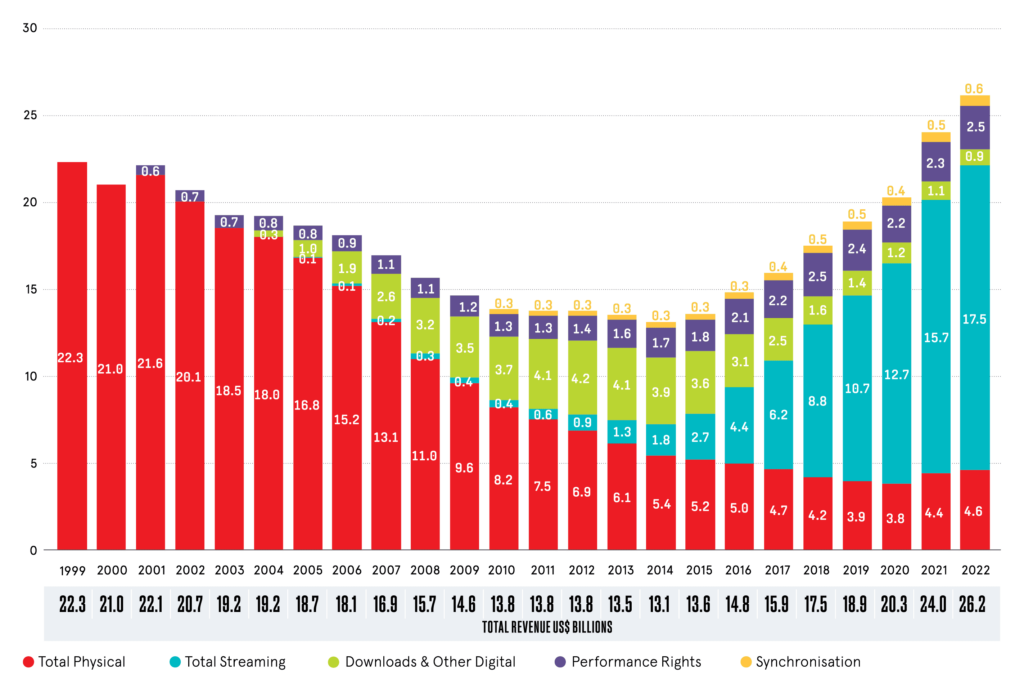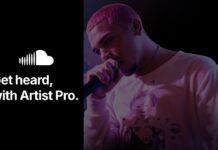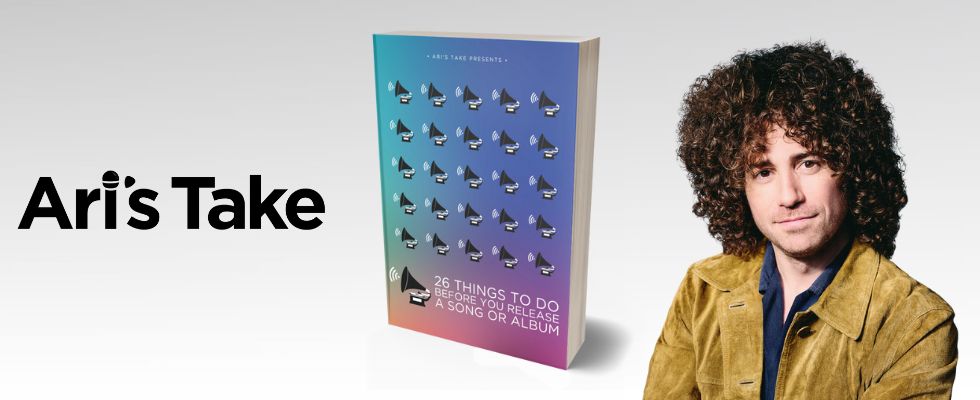Last week, UMG and Deezer made an announcement that is set to be the biggest upheaval to the recorded music industry payment structure since the launch of streaming.
UMG claims this new payment model will “better reflect the true value of artist-fan relationships.” I’m not so certain.
Artists and managers in the trenches, navigating a professional music career, have one vantage point. And major label CEOs have another. Rarely do visions align.
On one hand, most artists are just trying to figure out how to make a living. Whereas publicly traded, multinational major labels need to make their shareholders happy by showcasing tremendous profit and growth.
When major label CEOs say they care about artists, they’re lying. It’s against their job description to care.
They must care about shareholders first and foremost. They care about profits. By any means necessary.
This has been on full display for decades, but was made transparently clear the past few years when the majors scooped up every viral TikTok song to try and make a quick buck. The data is starting to emerge, but the vast majority of these artists who were signed to major labels based on a viral TikTok song in 2020, 2021, 2022, have since been dropped. Oftentimes after only putting out a single song.
+What Happens After a Band Gets Signed (and Dropped) From TikTok
Independent artists and labels have been commanding more and more global market share of recorded music year over year. The latest reports show that indies now hold around 35% of the market against the majors. This is up 8.5% market share from 2015. The major labels are scared.
So, instead of focusing on how to do their jobs better – like investing in artist development and working with artists on building long-term careers – the majors are simply rigging the game in their favor.
Last week, UMG and Deezer announced that it will be implementing an “artist-centric” payment model.
The two biggest components of this “artist-centric” model are:
- “Professional artists” will get a “double-boost” to royalty payments
- Songs that listeners actually searched for will also get a “double boost”
I support the second component. It makes sense to pay out more for songs that users are seeking out. A song being fed to a user on a playlist or from an algorithm should make less than a song that a fan sought out, by going to the artist’s profile and playing it. That’s true intent from a fan to an artist.
However, this first component is extremely problematic.
Deezer has defined a “professional artist” as those who have a minimum of 1,000 streams per month and a minimum of 500 unique listeners.
While 500 listeners and 1,000 streams may not sound like a lot, Deezer currently has only 9.3 million subscribers. Compare that to Spotify’s 550 million users. UMG is experimenting with this payment model on Deezer first, but their plan is most definitely to roll it out to the other streaming services.
When it hits Spotify the equivalent threshold would be around 30,000 unique listeners and 60,000 monthly streams!
As MIDiA’s Mark Mulligan expressed on X, Deezer and UMG have proposed “a reverse Robin Hood” model here, “taking income from struggling, emerging artists + sharing it among those who have already found success”
The idea of a teenage, aspiring bedroom producer having half their royalties taken to pay the likes of Taylor Swift feels like an odd reward for effort and creativity
7/12— Mark_Mulligan (@Mark_Mulligan) September 6, 2023
“The idea of a teenage, aspiring bedroom producer having half their royalties taken to pay the likes of Taylor Swift feels like an odd reward for effort and creativity” – Mark Mulligan, MIDiA
But it’s not just the “aspiring” artists who are being penalized. There are many professional, middle-class artists who have fewer than 500 unique listeners on Deezer.
UMG may argue that this minimum threshold is needed to combat the flood of AI generated music and fraud. This is the wrong approach. AI music is coming whether we like it or not. And so is more fraud. No matter where you set the minimum threshold, fraudsters will surpass it. But legitimate, smaller indie artists won’t. So not only are you not solving the problem of fraud or AI music flooding the DSPs, you’re hurting struggling artists in the process. But maybe that’s their intention.
The real issue is some professional artists – many with super-fans – are not being adequately compensated for their work, or the fandom they’ve built on streaming platforms.
UMG’s artist-centric model doesn’t address those problems. The current pro-rata model doesn’t, either.
+AI Isn’t the Music Industry’s Biggest Problem: Here’s How to Stop Streaming Fraud Right Now
A better solution is a user-centric payment model that pays out labels/distributors/artists based on the revenue generated from just the users who listened to their music.
Under a user-centric payment model, if you just listened to the indie artist ANNABEL LEE this month and paid a $10 subscription, all $10 (less the platform’s commission of about 30%) would go to ANNABEL LEE. If you listened to five artists this month, your $10 would get split amongst those five artists.
+ANNABEL LEE’s “Mother’s Hammer” is a Genre-Defying Masterpiece
The data says the user-centric model is actually the artist-friendly approach.
A SoundCloud / MIDiA report which analyzed 118,000 artist accounts for a year testing the user-centric payment model on SoundCloud, noted that the majority of the artists earned more revenue overall. Notably, nearly 65% of artists with fewer than 100,000 listeners earned far more revenue (than they would have under the pro-rata model), whereas only 38% of artists with over 100,000 listeners were better off. Since most major label artists have over 100,000 listeners, the user-centric model is not a system the majors would be inclined to implement. (Warner Music Group is the lone exception to date after signing onto SoundCloud’s user-centric model in 2022.)
It makes sense to reward artists for the listeners — and paying subscribers — they bring to streaming platforms. Artists with super-fans, will make more. Artists with merely passive listeners will make less. Many indie artists have super fans, but haven’t penetrated the mainstream and aren’t getting slotted into big playlists.
Whereas superstar artists, of course have super fans, but their music is so ubiquitous, that the majority of their streams are actually coming from passive listening – people listening to playlists or what’s fed to them by the algorithm.
Instead of taking from the poor to give to the rich, why not value the artist-fan relationship? Just because an artist doesn’t have enough fans for UMG or Deezer to deem worthy of compensation, doesn’t mean that their music is less valuable or meaningful. There could be 500 fans whose favorite artist falls below this threshold. Why should these artists be less worthy? Why should these real, professional artists get paid less?
A user-centric model would also solve a lot of the fraud that exists on streaming platforms by making it much less lucrative for bad actors to operate. It’s no secret that there are nefarious actors outside of the music industry who are using the current streaming payment model to get rich. Because of the current “pro-rata” payment system (that most DSPs like Spotify, Apple Music and TIDAL use), where labels/distributors/artists get paid out based on the share of their streams against all other streams on the platform, these bad actors have come up with innovative ways to siphon off a non-negligible amount of streams (using bots, hacked accounts, playlists and other methods), to shift this money away from “legitimate” artists to themselves.
+Streaming Fraud Is More Serious (and Inventive) Than You Think
And of course, now that AI has entered the picture, these bad actors, without any musical skill, can use AI music generating platforms to pump out passable “songs” and get them distributed to the streaming services more efficiently, juice up those streams via bots and other fraudulent means, and make revenue, quickly.
A user-centric payment model (away from the pro-rata payment model) would solve a lot of the fraud out there that exists. And would make it much harder for these bad actors to operate.
Zooming way out, streaming has been good for the macro music industry overall. In 2022, there was more money made from recorded music than in the history of the world – more than in the CD or vinyl eras (without adjusting for inflation). And it’s an increasingly large market for independent artists. That’s one reason why so many artists have chosen not to sign with major labels.

The vast majority of the 120,000 songs being uploaded every day to DSPs (Spotify, Apple Music, TIDAL, etc), are from self-released, DIY artists. MIDiA reported that in 2022, these self-released artists made over $1.8 billion (nearly 6% of total market share). The number one song on the Billboard Hot 100 last week, “Rich Men North of Richmond” by Oliver Anthony, was distributed by DistroKid.
Major labels hate that artists don’t need them anymore. But how all that money is getting sliced up and making its way to the actual creators of the music, has not been as promising.
Because there is so much music out these days, payments have become so diluted that artists and labels are struggling to make the numbers work.
Lucian Grainge, chairman and CEO of Universal Music Group, wrote in his New Year’s Message this past year that the “economic model for streaming needs to evolve.”
He wrote: “Under the current model, the critical contributions of too many artists, as well as the engagement of too many fans, are undervalued. Therefore, to correct this imbalance, we need an updated model. Not one that pits artists of one genre against artists of another or major label artists against indie or DIY artists. We need a model that supports all artists – DIY, indie and major. An innovative, ‘artist-centric’ model that values all subscribers and rewards the music they love. A model that will be a win for artists, fans, and labels alike, and, at the same time, also enhances the value proposition of the platforms themselves, accelerating subscriber growth, and better monetising fandom.”
Sounds nice.
We didn’t know what he actually meant by this. Or how it would actually work. Until now.
UMG is on a warpath right now to reclaim their market share by stealing from smaller, indie artists.
And thanks to Deezer, they are now one step closer.


















